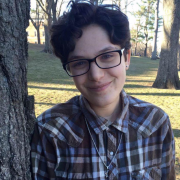Congratulations to our 2020 David Kirp ’65 Stonewall Prize Winners: Isabel Meyers ’20 and Theo Peierls ’20E

Isabel Meyers ’20
Something Else You Should Know
Department of English Honors Thesis
Excerpt and analysis:
"There’s a story I want to tell but don’t know how. It has to do with my grandparents, my mother, and myself, taking place in the ‘50s, the ‘80s, and last summer. It’s about secrets and history and queerness and books. It’s about who gets to tell stories and how they are told, who is listening and who writes them down. For a long time, I don’t tell my mother how much it hurt me that she didn’t tell me about my grandparents when I was younger. When my friends and I were left alone to grapple with our own bodies and desires, convinced that queerness was in the future but never the past. Would it have helped to know then? Would it have helped to feel known?"
When I was eighteen years old, I found out that both my grandparents were gay on the same night that I came out to my mother. For a very long time, I was at a loss of how to process this information. Six years had passed since my grandmother had died, and I was angry and confused why my mother had waited so long to tell me this secret. There were suddenly so many questions I wish I had been able to ask my grandparents when they were still alive; so many conversations and comparisons that we never got to share. I decided to write about their lives, first using the structure of a historical fiction novella and then in anecdotes about my relationship to them and to the process of writing such intimate material. When I began to research for this project I was unable to imagine queer life before the modern gay rights movement, and on a personal level, did not understand what compelled my grandparents to stay together even after their children were grown up. By writing this thesis, I sought to connect these intertwining historical and personal narratives, letting my grandparents grow into fully autonomous characters who loved, quarreled, and built a life together as participants in their ever-changing environment. My research for this project took me from the archives of Frost Library to the New York Historical Society and the streets of Greenwich Village. I was even lucky enough to attend a panel of the first members of SAGE, an organization that provides advocacy and resources to elderly LGBTQ+ folks that my grandparents attended together in the early 1980s. Watching these people speak about the group’s early activism helped me envision my grandparents as real people coming to terms with their roles in an increasingly active queer community. By writing about their lives, I hope to create an imaginative space for all the queer narratives that were either silenced or left untold in the previous decades. The more I researched for my thesis, the more important it became for this project to extend beyond the history of my family and offer a voice to those whose secrets never made it out of the closet.

Theo Peierls '20E
"Transing" Jewish Gender Roles: The Potentials of Emasculation and Deviance
Department of Sexuality, Women's and Gender studies Honors Thesis
Abstract: What are the radical potentials of how Jewish gender is understood, and of Jewish gender deviance? What fears prevent embracing these potentials? Over the course of seven chapters, I show that Jewish masculinity is inherently “transed,” and that there are significant overlaps between a transgender identity and a Jewish male identity due to both external forces of antisemitic stereotypes and internal forces of gender deviation from gentile norms. I explore “Jewish masculinity” as a form of masculinity that is distinct from mainstream understandings of what constitutes manhood, and is structured around the ways in which the Jewish patriarchy creates a manhood built on something other than gentile masculinity, and at times contains aspects of what is often coded as emasculated or feminine. In addition, Jewish men exist in the context of a nebulous understanding of gender, with several significant biblical figures going through “transing” moments, and with a major ritual premised on the idea of devoting oneself to God through an alteration of the genitals. I explore the ways in which assimilation threatens this Jewish gender nonconformity. Embracing a deviant Jewish gender expression and embracing trans inclusion in Jewish spaces can and should go hand in hand, as deviant masculinities hold the potential to disrupt the toxic cisheteropatriarchy that targets marginalized genders. Resisting assimilation, and recognizing the power in gender exploration and deviation, is vital to this potential disruption. Jewish men are made deviant in a gentile context for both their bodies and their gender expressions and hold the potential to serve as a tool in breaking down binary patriarchal gender assumptions.